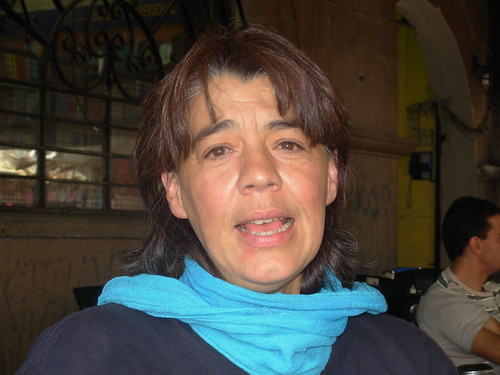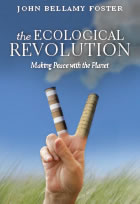Michael Lebowitz: '21st century socialism needs a 21st century Marxism'

May 23, 2009 -- Michael Lebowitz is a Canadian Marxist economist. He is the director of the “Transformative practice and human development” program at the Caracas-based left-wing think tank, the Centro Internacional Miranda. He is professor emeritus of economics at Simon Fraser University and author of Build it Now: 21st Century Socialism and the 2004 Isaac Deutscher-prize winning Beyond Capital: Marx's Political Economy of the Working Class.
Lebowitz was a featured speaker at the World at a Crossroads conference organised by Green Left Weekly, the Democratic Socialist Perspective and the socialist youth group Resistance, held in Sydney, Australia, on April 10-12, 2009. Christopher Kerr spoke with Lebowitz about capitalism's crisis and the socialist alternative.
Given the current economic crisis, is Marxism still relevant?
It is more relevant than ever. Marxism seeks to explain the underlying reasons for what is occurring and to seek out the alternatives.
South Korea: The legacy of the 1980 Kwangju uprising

South Korean troops march on Kwangju, May 1980.
On the weekend of May 15-18, 2009, the city of Kwangju, South Korea, held the Kwangju International Peace Forum to celebrate the struggle for democracy in South Korea and to support similar struggles elsewhere in Asia. Christopher Kerr of South Korea-based solidarity group Venceremos caught up with George Katsiaficas to discuss the legacy of the 1980 Kwangju uprising. Katsiaficas is visiting professor of sociology at Chonnam National University and author/editor of numerous books on international social movements including South Korean Democracy -- Legacy of the Gwangju Uprising and Unknown Uprisings: South Korean Social Movements Since World War 2).
* * *
Chris Kerr: What happened in May 1980 in Kwangju and how was it significant to the democracy movement at that time?
[This is the third in a series of regular articles. Click HERE for other articles in the series. Please return to Links regularly read the next articles in the series.]
By Marta Harnecker, translated by Federico Fuentes for Links International Journal of Socialist Renewal
1. We have previously stated that politics is the art of constructing a social and political force capable of changing the balance of forces in order to make possible tomorrow that which today appears to be impossible. But, to be able to construct a social force it is necessary for political organisations to demonstrate a great respect for grassroots movements; to contribute to their autonomous development, leaving behind all attempts at manipulation. They must take as their starting point that they aren’t the only ones with ideas and proposals and, on the contrary, grassroots movements have much to offer us, because through their daily struggles they have also learned things, discovered new paths, found solutions and invented methods which can be of great value.
Socialist Party of Malaysia condemns Sri Lanka's slaughter of Tamils
By the Socialist Party of Malaysia (Parti Sosialis Malaysia, PSM)
May 27, 2009 -- Sri Lankan President Mahinda Rajapaksa declared victory over Liberation Tigers of Tamil Eelam (LTTE) as the last LTTE strongpoints crumbled. The victory is for no one but only the chauvinistic nationalist Sinhalese government led by Rajapaksa, which had launched a brutal, merciless and cold-blooded military offensive against the Tamil population for several months, inflicting nothing but death, destruction and misery. The victory proclaimed by Rajapaksa will not put an end to the conflict that has lasted for several decades, but signals a new assault on working people in Sri Lanka -- Tamil, Sinhalese and Muslim.

By Rachel Evans
May 21, 2009 -- Coyacan, Mexico -- I interviewed Patria Jiménez in Coyacan’s normally bustling markets. The onset of the swine flu crisis had emptied the streets and enforced a stiffness into Mexico’s normally effusive greetings tradition. No kissing hello or shaking hands was encouraged. Jiménez ignored swine-flu protocol and greeted me warmly.
In 1997, Jiménez made history by being elected the first openly lesbian member of Mexico's Chamber of Deputies. Representing an alliance that included the the Workers Revolutionary Party (PRT) and the Party of the Democratic Revolution (PRD), Jiménez was also the first openly lesbian candidate to be elected in Latin America. She is standing again within a coalition, Salvemos a México (We Will Save Mexico), for the July 2009 federal elections.
Marta Harnecker: Ideas for the struggle #2 -- Convince, not impose


With the permission of John Bellamy Foster and Monthly Review Press, Links International Journal of Socialist Renewal is publishing an exclusive excerpt from Foster's latest book, The Ecological Revolution: Making Peace with the Planet.
Links readers are encouraged to purchase a copy of this important new book HERE.
The roots of the present ecological crisis, John Bellamy Foster argues in The Ecological Revolution, lie in capital’s rapacious expansion, which has now achieved unprecedented heights of irrationality across the globe. Foster compellingly demonstrates that the only possible answer for humanity is an ecological revolution: a struggle to make peace with the planet.
* * *
India’s 2009 general election: Lessons for the left

By Dipankar Bhattacharya, general secretary, Communist Party of India (Marxist-Leninist) Liberation
Tamil self-determination and the LTTE: Some lessons for the struggle
On May 23, 2009, anti-war activists joined members of Sydney's Tamil community in a march to protest the Sri Lankan government's war against the Tamil people, organised by the Stop The War Coalition.
* * *
By Reihana Mohideen
May 21, 2009 -- “To save the lives of our people is the need of the hour. Mindful of this, we have already announced to the world our position to silence our guns to save our people", said Selvarasa Pathmanathan, the head of Liberation Tigers of Tamil Eelam's (LTTE) International Diplomatic Relations on May 17, thus flagging the military defeat of the LTTE.
Pakistan: Appeal -- Help oppose the Taliban and government military operations
May 21, 2009 -- This is a formal appeal by the Labor Relief Campaign to help in the fight against the Taliban and the Pakistan government's military operations. The purpose is to provide immediate help to some of the more than 1.5 million internally displaced people from the Malakand Division of the North West Frontier Province (NWFP) in Pakistan. This displacement has resulted from the fight between the Taliban and the Pakistani government. We also aim to publish Mazdoor Jeddojuhd in the Pushto language more frequently. At present it is published weekly in Urdu and monthly in Pushto. We want to counter the ideas both of religious fanatics and state repression. We aim to aid the labour and social movements in the province by publishing their activities and views, bringing them together to form new networks.
The situation
The Taliban have taken over parts of Pakistan. They have threatened to occupy other parts as well. To pacify them, the government went into an accord with the Taliban this April 2009, imposing a so-called Nizam Adl (system of justice) in Malakanad. The Taliban then imposed medieval laws in the areas under their control, targeting women and minorities. This accord also provided the Taliban with the opportunity to move into other areas.
Blood for oil in Nigeria: Military launches massive attack on Niger Delta villages
May 21, 2009 – Democracy Now! – The Nigerian military has been accused of kill
